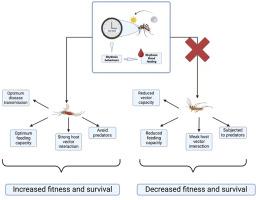Circadian rhythm of mosquitoes: Blood feeding and disease transmission
引用次数: 0
Abstract
The circadian rhythm refers to the adjustment of behavioural rhythms of organisms' to the environmental cues. The rhythm adjusting and maintaining is done through an internal timekeeping mechanism. The timekeeping mechanism is governed through a series of translational transcription feedback loops that obtain the environmental cues from outside and translate them to behavioural rhythms through a series of neurotransmitters and gene transcriptions. The behavioural rhythms are essential for the animals to stay in optimal conditions. The circadian rhythm is especially important for blood-feeding arthropods, such as mosquitoes, to adjust their feeding times to the optimal time window of the day. The time window depends on host availability, evasion of predators, and other factors like humidity and temperature. This process ensures the optimum feeding and maximum efficiency in the parasite transmission. This mechanism plays an important role in the mosquito-borne disease transmission. Furthermore, due to the blood meal-induced processes such as trypsin activation and vitellogenesis, the time of blood meal might affect the mosquito's survival and reproductive health. The circadian timekeeping mechanism depends on external environmental cues. The changing of the environmental conditions due to climatic change and human intervention may alter the circadian behavioural rhythms and make erratic behaviours that are hard to predict and, in turn preventing the spread of mosquito-borne diseases. In here, we look into the circadian patterns in blood feeding in mosquitoes, the impact of environmental factors, the genetic control, and how it might contribute to the disease transmission.

蚊子的昼夜节律:吸血和疾病传播
昼夜节律是指生物体根据环境因素对行为节律的调整。节奏的调整和保持是通过内部计时机制完成的。这种计时机制是通过一系列的翻译转录反馈循环来控制的,这些循环从外部获取环境信号,并通过一系列的神经递质和基因转录将其转化为行为节律。行为节奏对动物保持最佳状态至关重要。昼夜节律对于吸血节肢动物(如蚊子)来说尤其重要,可以将它们的进食时间调整到一天中的最佳时间窗口。时间窗口取决于宿主的可用性、躲避捕食者以及湿度和温度等其他因素。这一过程确保了最佳的摄食和寄生虫传播的最高效率。这一机制在蚊媒疾病传播中起着重要作用。此外,由于血餐诱导胰蛋白酶激活和卵黄形成等过程,血餐时间可能影响蚊子的生存和生殖健康。昼夜节律计时机制取决于外部环境线索。气候变化和人为干预造成的环境条件变化可能改变昼夜行为节奏,造成难以预测的不稳定行为,从而防止蚊媒疾病的传播。在这里,我们研究蚊子吸血的昼夜节律模式,环境因素的影响,基因控制,以及它是如何导致疾病传播的。
本文章由计算机程序翻译,如有差异,请以英文原文为准。
求助全文
约1分钟内获得全文
求助全文

 求助内容:
求助内容: 应助结果提醒方式:
应助结果提醒方式:


